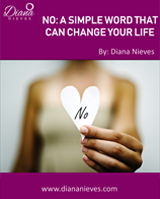Diana Nieves is passionate about helping others love better, so she has teamed up with One Love Foundation to help teach others about healthy and unhealthy relationships and how to love better. She is doing this be raising awareness about the organization and the signs of healty vs. unhealthy relationships, donating and raising money and leading Escalation Workshops.
One Love Foundation
Love is the most important thing in our lives, yet we are taught very little about it. One Love is on a mission to change that. One Love Foundation educates young people about healthy and unhealthy relationships, empowering them to identify and avoid abuse and learn how to love better. One Love Foundation engages young people with powerful films and honest conversation. Through workshops and peer-to-peer discussions, One Love offers a framework that helps students spread their message online and in their communities.
FREE Escalation Workshop Facilitated by Diana Nieves
Unhealthy relationship behavior often goes unrecognized, because we don’t have the tools to identify it. One Love’s workshops include captivating films and peer-to-peer discussions that open eyes and start life-changing conversations. Escalation is a 90-minute film-based workshop that has changed countless lives. The impactful film chronicles the unhealthy relationship of a college-aged couple and is followed by a discussion with trained facilitator, Diana Nieves. Contact Diana to schedule this moving and thought-provoking experience in your school or community. This workshop is free. Diana encourages you and others to make a donation to One Love Foundation
10 Signs of a Healthy Relationship
Healthy relationships bring out the best in you and make you feel good about yourself. A healthy relationship does not mean a “perfect” relationship, and no one is healthy 100% of the time, but the signs below are behaviors you should strive for in all of your relationships. Healthy relationships manifest themselves as healthy communication; another important part of a healthy relationship is loving yourself. Here are some characteristics and behaviors of a healthy relationship.
You and your partner allow the relationship to happen at a pace that feels comfortable for both of you. Often times when you begin dating someone, you may feel that you’re spending all of your time with them because you want to – that is great! But be sure that nothing feels imbalanced or rushed in the relationship. In a healthy relationship, nobody pressures the other to have sex, make the relationship exclusive, move in together, meet their family and friends, get married, or have a baby. When you do choose to take these steps, you both feel happy and excited about it—no mixed feelings.
Believing your partner won’t do anything to hurt you or ruin the relationship. Examples are when your partner is comfortable when you do things without them, has faith that you won’t cheat on them, respects your privacy online (like who you text and Snapchat), and doesn’t make you go out of your way or work hard to “earn” their trust.
Being truthful and open with your partner. It’s important to be able to talk together about what you both want. In a healthy relationship, you can talk to your partner without fearing how they’ll respond or if you’ll be judged. They may not like what you have to say, but a healthy partner will respond to disappointing news in a considerate way. Some examples are having good communication about what you both want and expect and never feeling like you have to hide who you talk to or hang with from your partner.
Having space and freedom in your relationship to do you. Examples are when your partner supports you having friends and a life outside of your relationship and not needing to be attached at the hip or know every little detail about your life.
If respect is present in your relationship, your partner will value your beliefs, opinions and who you are as a person. Examples are complimenting you, supporting your hard work and dreams, not trying to push or overstep your boundaries, and sticking up for you.
You and your partner have the same say and put equal effort into the relationship (instead of feeling like one person has more say than the other). Examples are feeling like you are heard in your relationship or feeling comfortable speaking up, making decisions together as opposed to one person calling all the shots, and equally compromising on decisions in your relationship that make the other person feel important or respected.
Feeling a sense of care and concern from your partner and knowing that they will be there to support you, too. If you’re in a healthy relationship, your partner will be kind to you, they will understand and be supportive of you when you’re going through tough times, and they will lend a helping hand in times of need. An important caveat is that it has to be two-sided and displayed equally.
You and your partner are both responsible for your own actions and words. You both avoid putting blame on each other and own up to your actions when you do something wrong. Examples are when your partner genuinely apologizes for their mistakes, they avoid taking things out on you when they’re upset, and they try to make positive changes to better your relationship.
When your partner is reliable, and you feel confident that they have your back. Some examples are when your partner is respectful and faithful, sticks up for you, doesn’t take sides against you but helps you see the middle ground, and keeps your secrets safe. In a healthy relationship, you don’t have to test the other person’s loyalty, because you just know it’s there. Sometimes people say, “we all make mistakes” and “nobody’s perfect” to make excuses for disloyalty. If you find yourself saying that more than once, it’s a red flag that the relationship may not be healthy.
If you can talk to your partner about anything—the good and the bad—this is a sign of a healthy relationship. Examples are when you feel like your partner will listen to you when you need to talk and that they are open to discussing further and when you don’t feel judged for your words or opinions.
10 Signs of an Unhealthy Relationships
While everyone does unhealthy things sometimes, we can all learn to love better by recognizing unhealthy signs and shifting to healthy behaviors. If you are seeing unhealthy signs in your relationship, it’s important to not ignore them and understand they can escalate to abuse. If you think you are in a dangerous situation, trust your gut and get help
Having really extreme feelings or over-the-top behavior that feels like too much. Examples are rushing the pace of a relationship, always wanting to see you and talk to you, and feeling like someone is obsessed with you.
An emotion that everyone experiences, jealousy becomes unhealthy when someone lashes out or tries to control you because of it. Examples can be getting upset when you text or hang out with people your partner feels threatened by, accusing you of flirting or cheating, being possessive over you or even going so far as to stalk you.
When a partner tries to influence your decisions, actions or emotions. Manipulation is not always easy to spot, but some examples are convincing you to do things you wouldn’t normally feel comfortable with, ignoring you until they get their way, and using gifts and apologies to influence your decisions or get back in your good graces.
Keeping you away from friends, family, or other people. Examples can be when your partner makes you choose between them and your friends, insisting you spend all your time with them, making you question your own judgement of friends and family, and making you feel dependent on them for money, love or acceptance.
Purposely ruining your reputation, achievements or success. Examples can be making you miss work, school or practice, keeping you from getting schoolwork done, talking about you behind your back or starting rumors, and threatening to share private information about you.
Making you feel bad about yourself. Examples can be calling you names, making rude remarks about who you hang out with, your family or what you look like, and making fun of you – even if it’s played off as just a joke.
Making you feel guilty or responsible for your partner’s actions. Examples can be making you feel responsible for their happiness, making you feel like everything is your fault, threatening to hurt themselves or others if you don’t do as they say or stay with them, pressuring you to do anything sexual you’re not comfortable with.
Unpredictable overreactions that make you feel like you need to walk on eggshells around them or do things to keep them from lashing out. Examples can be mood swings, losing control of themselves by getting violent or yelling, threatening to hurt you or destroy things, and making you feel afraid of them. This can also be lots of drama or ups and downs in a relationship.
Making excuses for their behavior. Examples can be blaming you, other people or past experiences for their actions, using alcohol or drugs as an excuse, using mental health issues or past experiences (like a cheating ex or divorced parents) as a reason for unhealthy behavior.
When your partner acts differently with you versus how they act when you’re not around. Examples can be lying to you, purposely leaving you out or not telling you things, being two-faced, acting differently around friends, or cheating while in a relationship with you.


